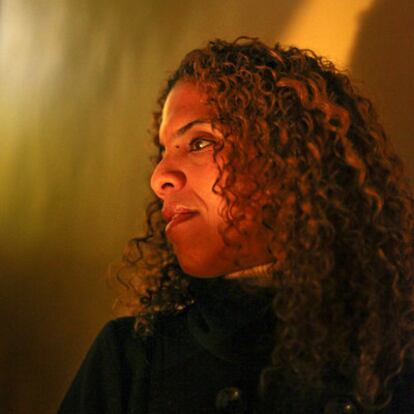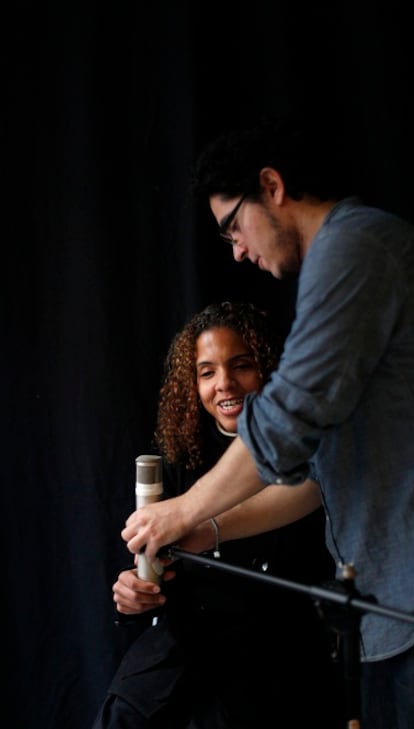Saved by the music, once again
Blind since childhood, Cuban singer Danays Bautista lost her arm in a Madrid subway accident
- ¡Eh, mi Chini! Vamos a gosal! (Hey, my Chini! Let's have some fun!)
"Mi Chini" is Danays Bautista, formerly a guitarist, composer and singer. These days, she just sings. But the part about having fun is no exaggeration. For the 38-year-old Danays, music is pure enjoyment. When rehearsals begin and she's glued to the microphone, she seems to float above the enormous black curtains that muffle the sounds made inside a room full of instruments.
"Ce una strada, solo mia, da trovare..." ("There is one road that's only mine for me to find"), she strikes up very softly. The song is Ora, by Chiara Civello, and it is the first number of the set she is due to perform the next day with three other Cuban musicians at the jazz festival in Madrid's Conde Duque center. It is a passionate song that seems tailor-made for her, and speaks about a suitcase "filled with fear."
Danays has been obsessed with the same image for months. In it, she is falling very slowly on to the subway tracks and then a train cuts off her arm almost entirely. It happened on May 17, 2010, the day when one life ended and another one began - the one where the suitcase full of fears slowly emptied out. "I would love to be able to live exactly in the here and now," Bautista always says, with a broad smile. She's looking for the way, that path that is hers and hers alone.
On that day, as she was falling almost in slow motion, all she could think was one thing: "What a bummer to inflict this pain on my family again!"
By again, she meant after the accident that left her blind as a child. She got around the darkness then with the help of a guitar that she began playing at the age of 15 and her friend Juán Pérez (who doubles as her guide and the group's photographer) asserts she used to play "like Wes Montgomery himself."
Growing up in Havana, jazz was "like your ABCs, something musicians carry in their blood." In 2001 she started to lead a jazz band that filled the venues of the Cuban capital's alleyways. But then she decided to pursue her dream across the ocean, and in 2008 came to Spain to find her way and make a living from her music.
And there she was, slowly looking for her niche, when she went down to Nueva Numancia subway station, near her Madrid home. She was walking with her stick ("my Ferrari," she calls it) and attempted to walk into the train where there was no door - she stepped between the third and fourth cars instead. Everything happened quickly. The emergency brake made a screeching sound, and there were screams. An ambulance took her to Gregorio Marañón hospital, where surgeons worked for 13 hours to try to reattach her arm, to no avail. She has memories of lots of visits mixed in with the hallucinatory effects of the drugs she was given, which made her think she was going mad. Then there was the pain. The tragedy that seemed set to ruin her career made the news.
Meanwhile, lying in bed, Danays was facing the shock of reality. She ordered her three guitars taken out of her room. Later she had them brought back.
How she missed that guitar during that first concert, a month after spending "40 days and 500 nights" sedated and hospitalized. "It was bad, bad! Something was missing. My understanding of music came through the guitar," she says.
But these days she does not miss it as much. "I'm liking this singing thing, your mind wanders less and you pay more attention to your voice."
And that is why she is not pushing her voice during rehearsals, right ahead of a concert that making her just a little bit nervous. "I get more stressed about having the arrangements ready in time, and especially about the promotional work," she admits.
The whole thing comes at a time when making a living is not easy, she admits. "My career profile is not very broad, and I've spent months nursing wounds." The train took her arm and destroyed her ribs. "Everything is broken, but I've got titanium armor inside full of plates and screws; I'm Robocop," she jokes.
Danays often resorts to a slightly dark kind of humor - like when a friend called her up at the hospital to ask how she was doing: "Oh, you know, training for the rowing competition," she replied.
Until now, she has lived off donations from friends and strangers following the accident. Several fundraising concerts were held. Meanwhile, she is stuck in a legal battle with the Metro authorities, who are offering her 30,000 euros of the insurance money. Her lawyer wants the subway authority to pay her damages as well.
In the meantime, rehearsals continue. "First I thought it was all over," she says, looking sad. "Later I started to understand that you need to move on, that there is no choice, that you cannot live in the emergency room forever."
Like her beloved jazz itself, Danays Bautista just goes on reinventing herself.


Tu suscripción se está usando en otro dispositivo
¿Quieres añadir otro usuario a tu suscripción?
Si continúas leyendo en este dispositivo, no se podrá leer en el otro.
FlechaTu suscripción se está usando en otro dispositivo y solo puedes acceder a EL PAÍS desde un dispositivo a la vez.
Si quieres compartir tu cuenta, cambia tu suscripción a la modalidad Premium, así podrás añadir otro usuario. Cada uno accederá con su propia cuenta de email, lo que os permitirá personalizar vuestra experiencia en EL PAÍS.
¿Tienes una suscripción de empresa? Accede aquí para contratar más cuentas.
En el caso de no saber quién está usando tu cuenta, te recomendamos cambiar tu contraseña aquí.
Si decides continuar compartiendo tu cuenta, este mensaje se mostrará en tu dispositivo y en el de la otra persona que está usando tu cuenta de forma indefinida, afectando a tu experiencia de lectura. Puedes consultar aquí los términos y condiciones de la suscripción digital.








































